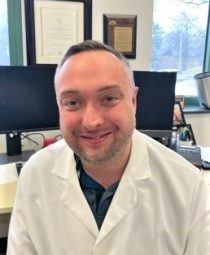Research

Director, Laboratories of Molecular Neuroscience
Professor, Departments of Psychiatry and Cell Biology
NYU Grossman School of Medicine
Nixon NYU Page
Ralph.Nixon@nyulangone.org
Nixon Laboratories
Synapse Dysfunction in Alzheimer’s Disease and Other Dementias
Dementias are well recognized to originate from dysfunction of synapses. Collaborating scientists in the Center for Dementia Research, led by Dr. Ralph Nixon, address the multifactorial basis for progressive synaptic failure in Alzheimer’s Disease (AD).
The Nixon lab together with the other staff in the Laboratories for Molecular Neuroscience has shown that endosomal–lysosomal defects, the earliest neuronal abnormalities arising in AD, stem directly from the proteins encoded by genes that cause the disease (amyloid precursor protein and presenilins) or that increase AD risk. We established that abnormal signaling by endosomes disrupts synaptic dysfunction and survival of cholinergic neurons leading to memory decline. Novel mice modeling the endosomal miss-signaling seen in AD recapitulate the key prodromal and degenerative features of AD. A recent Phase 2 clinical trial of neflamapimod/VX-7645, a small molecule inhibitor of abnormal endosome signaling, is one of the first agents to significantly slow CSF marker evidence of neurodegeneration in AD subjects.
Related lysosomal dysfunction causes the hallmark neuritic dystrophy of AD and the uniquely massive accumulations of metabolic waste seen in AD neurons, including the build-up of neurotoxic amyloid and tau, and which ultimately results in extensive neuron loss. We are defining the two-way trafficking of molecules and organelles between the nucleus and the synapse critical to maintaining diverse synaptic functions related to cognition. An accelerated program is ongoing to validate preclinically new molecular targets identified in our research using newly developed methods to quantify in vivo the therapeutic efficacy of new drug strategies against these targets.
Another major research effort in the Nixon lab focuses on the axonal transport, assembly, and turnover of cytoskeletal proteins and their dysregulation within synapses in relation to dementing diseases. Current multi-omic and functional analyses of synapses are tracking the interactions of neurofilament subunits with synaptic proteins genetically linked to multiple neurocognitive disorders.
Research Interests
In major neurodegenerative diseases, such as Alzheimer’s and Parkinson’s, the abnormal accumulation of one or more polypeptides within or around neurons is central to pathogenesis. Our research focuses on two aspects of neurobiology that govern the fate of normal and pathogenic proteins: the regulation of proteolytic processing and the control of protein export into axons and synapses. We have identified dysfunction of the endosomal-lysosomal system, involving altered endocytosis and mistrafficking of proteases to endosomes, as the earliest known pathological response of neurons in Alzheimer’s disease. Our cell modeling studies show early endosomes to be major generators of the toxic ß-amyloid peptide and implicate dysfunction of endosomes in the mechanism of β-amyloid accumulation in “sporadic” Alzheimer’s, the most common form of the disease. Genetic manipulations of proteolytic systems in mice are being used, together with cell culture models, to determine the consequences of endosomal-lysosomal and calpain system dysfunction on processing of Alzheimer-related proteins, receptor-mediated signal transduction, and neuronal cell death pathways.
To maintain neural circuitry, neurons transport a large proportion of their newly synthesized proteins into axons. The perikaryal accumulation of specific cytoskeletal proteins – a pathological hallmark of Alzheimer’s, ALS, and other neurologic diseases – is believed to arise in part from impaired axonal transport. A second interest of our research is to identify the molecular determinants of cytoskeletal protein transport and assembly in neurons. For example, we are defining the minimum structural requirements for neurofilament translocation by studying axonal transport and axon ultrastructure in mice after targeted deletion or mutagenesis of each of the three neurofilament subunit genes. Neurofilament transport is also regulated by sequential protein phosphorylation, triggered in part by signals from oligodendroglial cells. We have been determining the signaling pathways, phosphorylation sites, and functional implications of these post-translational modifications. Disease relevance is also being explored in several behavioral and psychiatric settings.
Laboratories for Molecular Neuroscience
Principal investigators in the Laboratories for Molecular Neuroscience directed by Ralph A. Nixon, M.D., Ph.D., include Dun-Sheng Yang M.Med., Ph.D., Mala V. Rao, Ph.D., David (Aidong) Yuan, M.D., Ph.D., as well as Research Project Managers Ju-Hyun Lee, Ph.D. and Ying Jiang, Ph.D., who are addressing additional facets of synaptic failure.
Education
A.B. Brandeis University, Waltham, MA
Ph.D. (Cell and Developmental Biology) Harvard University, Cambridge, MA
M.D. University of Vermont, College of Medicine, Burlington, VT
Postdoctoral Training
Medical Intern, Salem Hospital, Salem, MA
Resident in Psychiatry, Massachusetts General Hospital, Boston, MA
Resident in Psychiatry, McLean Hospital, Belmont, MA
Awards and Honors (Selected)
2024 Khalid Iqbal Lifetime Achievement Award, Alzheimer’s Association International Conference
2023 Thomson Reuters/ Clarivate Highly Cited Researcher
2022 The Gold Oskar Fischer Award
2021 The Leonard Litwin Scholar Award
2015 Zaven Khachaturian Award, Alzheimer’s Association International Conference
2011 Fellow, American College of Neuropsychopharmacology (ACNP)
2011 Member, Board of Directors, National Alzheimer’s Association
2010 Mensch Award – AlzForum
2004 Election to American College of Neuropsychopharmacology (ACNP)
2003 Zenith Award, Alzheimer’s Association
1999 Research Award for 1999, New York State Office of Mental Health
1999 Temple Foundation Discovery Award – Alzheimer’s Association
1999 Academic Career Leadership Award, National Institute on Aging
1994-1995 Chairman, Neuroscience, Behavior and Sociology of Aging Review Committee, National Institute on Aging
1992-1999 LEAD Award (Leadership and Excellence in Alzheimer Research), National Institute on Aging
1990 MERIT Award, National Institutes of Health
1983-1985 Scottish Rite Schizophrenia Research Program Fellowship Award
1981-1983 Alfred P. Sloan Foundation Fellowship Award
1980-1982 Medical Foundation Research Fellowship Award
1979-1980 Ethel DuPont Warren Fellowship Award
1976 University of Vermont General Research Award
1976 Herbert Martin, Sr., Neurology Prize
Selected Publications
Nixon RA, Rubinsztein DC. Mechanisms of autophagy-lysosome dysfunction in neurodegenerative diseases. Nat Rev Mol Cell Biol. 2024 Nov;25(11):926-946. doi: 10.1038/s41580-024-00757-5. Epub 2024 Aug 6. PMID: 39107446.
Lee JH, Yang DS, Goulbourne CN, Im E, Stavrides P, Pensalfini A, Chan H, Bouchet-Marquis C, Bleiwas C, Berg MJ, Huo C, Peddy J, Pawlik M, Levy E, Rao M, Staufenbiel M, Nixon RA. Faulty autolysosome acidification in Alzheimer’s disease mouse models induces autophagic build-up of Aβ in neurons, yielding senile plaques. Nat Neurosci. 2022 Jun;25(6):688-701. PMID: 35654956; PMCID: PMC9174056.
Jiang Y, Alam JJ, Gomperts SN, Maruff P, Lemstra AW, Germann UA, Stavrides PH, Darji S, Malampati S, Peddy J, Bleiwas C, Pawlik M, Pensalfini A, Yang DS, Subbanna S, Basavarajappa BS, Smiley JF, Gardner A, Blackburn K, Chu HM, Prins ND, Teunissen CE, Harrison JE, Scheltens P, Nixon RA. Preclinical and randomized clinical evaluation of the p38α kinase inhibitor neflamapimod for basal forebrain cholinergic degeneration. Nat Commun. 2022 Sep 21;13(1):5308. PMID: 36130946; PMCID: PMC9492778.
Lie PPY, Yoo L, Goulbourne CN, Berg MJ, Stavrides P, Huo C, Lee JH, Nixon RA. Axonal transport of late endosomes and amphisomes is selectively modulated by local Ca2+ efflux and disrupted by PSEN1 loss of function. Sci Adv. 2022 Apr 29;8(17):eabj5716. PMID: 35486730; PMCID: PMC9054012.
Pensalfini A, Kim S, Subbanna S, Bleiwas C, Goulbourne CN, Stavrides PH, Jiang Y, Lee JH, Darji S, Pawlik M, Huo C, Peddy J, Berg MJ, Smiley JF, Basavarajappa BS, Nixon RA. Endosomal Dysfunction Induced by Directly Overactivating Rab5 Recapitulates Prodromal and Neurodegenerative Features of Alzheimer’s Disease. Cell Rep. 2020 Nov 24;33(8):108420. PMID: 33238112; PMCID: PMC7714675.














